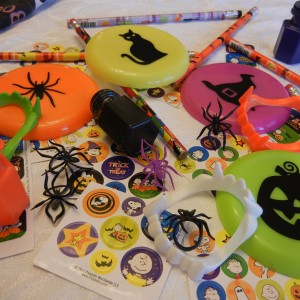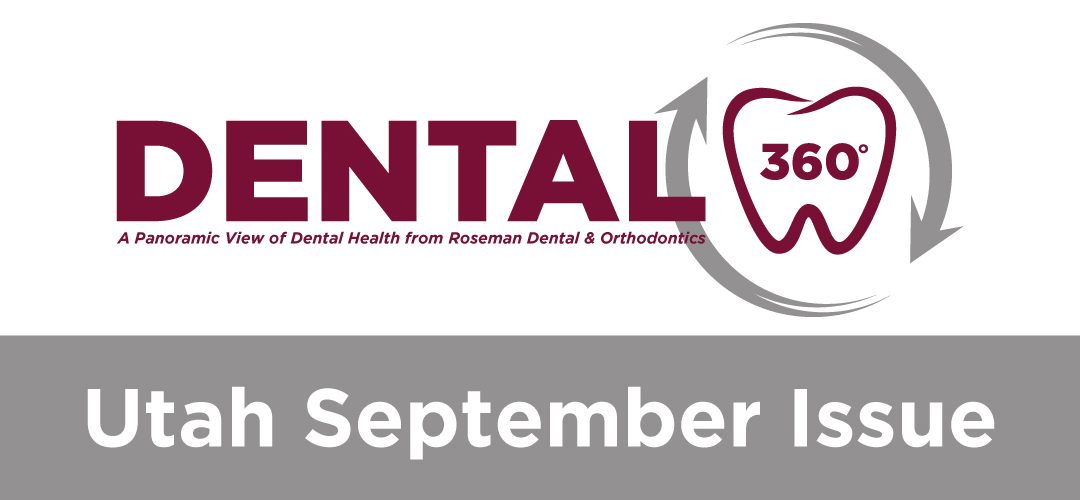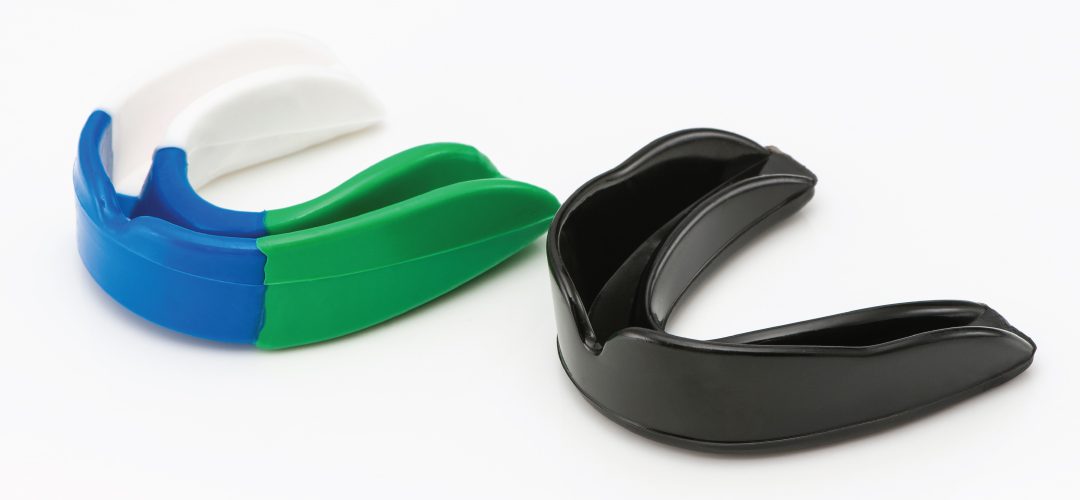
by Roseman Dental | Oct 12, 2021 | Dental Clinic Blog, Oral Health, Roseman Dental - NV, Roseman Dental - UT
 Halloween is a time of year when ghosts, ghouls, princesses and superheroes alike head out into their neighborhoods in search of scrumptious candy. It’s also a holiday that can wreak havoc on your oral health because of the volume—and type—of candy and sugar you are consuming. Whether you’re planning to dress up for a Halloween party, wondering what to give out this year, or just want to be prepared for when your kids bring home buckets of sugar, here are some tips to help you avoid oral health problems.
Halloween is a time of year when ghosts, ghouls, princesses and superheroes alike head out into their neighborhoods in search of scrumptious candy. It’s also a holiday that can wreak havoc on your oral health because of the volume—and type—of candy and sugar you are consuming. Whether you’re planning to dress up for a Halloween party, wondering what to give out this year, or just want to be prepared for when your kids bring home buckets of sugar, here are some tips to help you avoid oral health problems.
Best Halloween Candies for Your Teeth
While your dentist will tell you (correctly) that no candy is actually “good” for your teeth, there are some options that are less bad and should be selected when possible. That includes things like chocolate without sticky fillings or nuts, marshmallows, and softer cookies that won’t stick to your teeth (check out the recipe for a delicious pumpkin season treat below). Even if you avoid sticky treats, it’s important to realize that the sugar in candy feeds bacteria in your mouth, contributing to the buildup of plaque, so you should rinse your mouth with water and try to brush your teeth soon after consuming any sugar.
Worst Halloween Candies for Your Teeth
Sticky treats are by far the worst because they leave sugary nuggets in the deep grooves of your teeth where they are available for bacteria to feed on. That includes things like taffy, caramel, coconut and nuts. Other bad choices include hard candies like lollipops, jawbreakers, and Jolly Rancher™ candies, because they expose your teeth to sugar for a prolonged period of time while they are dissolving (which raises acidity levels in your mouth and damages tooth enamel). Plus, if you try to bite them, your teeth might even chip or break. Sour candies should be avoided because they are highly acidic, as well as candies like Pixie Stix® powder that provide straight sugar for the bacteria in your mouth to consume.
Individuals with braces should be especially careful about eating these treats. Make sure to speak with your orthodontist prior to Halloween to get a list of treats to specifically avoid because they can get stuck in and around the braces, causing decay and damaging the hardware in your mouth.
Healthy Candy Alternatives
 If you plan on being home to pass out treats for trick-or-treaters, there are various healthy, non-candy alternatives you can give to those who come knocking on your door. Healthy alternatives include mini packages of raisins, pretzels, or crackers, which can be purchased at your local grocery store and are typically in Halloween-themed packaging.
If you plan on being home to pass out treats for trick-or-treaters, there are various healthy, non-candy alternatives you can give to those who come knocking on your door. Healthy alternatives include mini packages of raisins, pretzels, or crackers, which can be purchased at your local grocery store and are typically in Halloween-themed packaging.
For folks who want to avoid handing out any food items to trick-or-treaters, there are plenty of things available at a reasonable price. You could hand out pencils, stickers, erasers, slime, spider rings, mini coloring books, temporary tattoos, or plastic vampire fangs. You can find all of these in Halloween designs, and buy them in bulk at places such as Oriental Trading Company, U.S. School Supplies, and Amazon.com.
Check out this braces- and teeth-friendly recipe to enjoy for Halloween and the fall season:
Pumpkin Chocolate Chip Cookies
1 cup pumpkin puree (canned)
1 cup granulated sugar
1/2 cup vegetable oil
1 egg
2 tsp. milk (whole)
1 tsp. vanilla
2 cup all-purpose flour
2 tsp. baking powder
2 tsp. pumpkin pie spice
1/2 tsp. salt
1 tsp. baking soda
1 tsp. chocolate chips (mini)
Directions
- Combine pumpkin puree, sugar, vegetable oil, egg, milk, and vanilla; set aside
- Combine together all dry ingredients, except for chocolate chips; add to wet ingredients, combine well
- Stir in chocolate chips
- Bake at 350 °F for 10-15 minutes

by Roseman Dental | Sep 14, 2021 | Dental 360, Dental Clinic Blog, Roseman Dental - UT
Fall has arrived, school is back in session and our Dental 360° e-newsletter has returned from summer break. During this September issue of Dental 360°, you’ll learn about how our clinic was able to provide free dental screenings and cleanings to 200 kids 18 and under. With sports in full swing, you’ll learn the importance of wearing a mouthguard. In addition, you’ll be educated on the benefits of dental sealants and tips for caring for your children’s teeth.
Roseman Dental’s Dental 360° is a monthly e-newsletter. Each month you’ll receive a panoramic view of dental health. Dental health is key to your overall health and here at Roseman Dental, we are dedicated to improving not only your mouth, but your whole self. At our clinic we have an excellent team of licensed dentists, dental residents and students, and dental assistants and hygienists all focused on you and your family’s oral health. We offer comprehensive care, are a one-stop shop for all your dental needs and offer dental care at a cost typically lower than what you would find at a traditional dental office. Roseman Dental has been serving its community since 2011 and we look forward to continuing to serve you and your family.
We hope you find Dental 360° helpful and informative. We look forward to connecting with you each month.
Dental 360° September Articles
Roseman Dental Cares for 200 Kids at Free Back to School Brush-Up™ Event
The Importance of Wearing Mouthguards
The Benefits of Dental Sealants
Caring for Your Children’s Teeth

Click Here to Leave a Review

by Roseman Dental | Sep 13, 2021 | Clinic Events - UT, Dental 360, Dental Clinic Blog, Roseman Dental - UT
Last month Roseman Dental held its annual free Back to School Brush-Up™ event where our dental students and faculty provided dental screenings and cleanings to children in grades Kindergarten through 12th grade for the 2021 – 2022 academic school year. Those that attended the event received a voucher to return to Roseman Dental for a free comprehensive exam, free x-rays, and up to $50 in additional care. While waiting to be treated, participants enjoyed the oral health carnival where they learned about good oral hygiene habits and tips, how to properly brush their teeth and floss and what foods are good and bad for your teeth through several interactive carnival games.
At the end of the day, Roseman Dental students, faculty and staff were able to provide free dental screenings and cleanings to 200 children. Of the 200 patients treated, 37.91 percent hadn’t seen a dentist in over a year. In addition, 109 out of the 200 children did not have dental insurance.
This event was not possible without our wonderful sponsors. Thank you to our Presenting Sponsor – Intermountain Healthcare – and our two Bronze Sponsors – KKOS Lawyers and Northern Wasatch Association of Realtors. Your contributions allowed us to provide needed dental care to children in our community.
Roseman Dental will be hosting its annual Give Kids a Smile® event on Friday, February 4 where our dental students and faculty will be providing free dental screenings and cleanings to children 18 and under. Those that attend will receive a voucher to return to Roseman Dental for a free comprehensive exam, x-rays, sealants, and up to $50 of additional care. For more information about this event click here.

by Roseman Dental | Sep 13, 2021 | Dental 360, Dental Clinic Blog, Oral Health, Roseman Dental - NV, Roseman Dental - UT
A Guide for Proper Dental Treatment at Every Age
When your child was first born you probably started following a rigorous schedule of appointments with your pediatrician to keep him or her healthy. Many parents are not aware that children also need proper dental care and oral check-ups starting at an early age.
Tooth decay in toddlers, preschoolers, and school-age children is one of the leading preventable diseases in the U.S. It can lead to several health and lifestyle complications, including pain and soreness, improper speech development, inability to chew properly, missed school days, premature loss of baby teeth, infections, inflammation and gum disease. Here is a quick guide to help you understand your child’s oral care needs from birth through teenage years.
Baby Teeth
Just because kids lose baby teeth doesn’t mean they don’t need them—baby teeth are important placeholders for adult teeth and are at risk for tooth decay without proper care.
Birth to 12 months:
- Make oral health check-ups part of your baby’s well-child visits with your doctor.
- When the first teeth erupt from the gums, wipe them gently with a wet washcloth or lightly brush them with water and an extra soft bristle toothbrush. Do not use toothpaste.
12 to 24 months:
- Brush your child’s teeth at least twice a day using a baby toothbrush and water. Talk to the dentist about whether you should use toothpaste.
- Avoid sugary drinks like juice or milk between meals and fill bottles with water when putting children to sleep.
- Wean children of sucking habits on things like pacifiers or thumbs.
- Take your child for their first visit with a dentist before age 2.
- Talk to your dentist about how to help your child get enough fluoride, especially in Utah where it’s not added to the water supply.
Children’s Teeth
Baby teeth play a role in helping toddlers and preschoolers with chewing, swallowing, speech development, and creating space for adult teeth.
Ages 2-5:
- Help children brush their teeth for 2 minutes, 2 times a day. Use a soft-bristle toothbrush and a pea-size amount of fluoride toothpaste, making sure the child doesn’t swallow it.
- Begin flossing as soon as two teeth touch each other.
- Dentists recommend that you continue to help your child brush until the age of 4, or around the time they have the motor skills to neatly write their name.
- Go in for dental check-ups once or twice a year.
- Fill sippy cups with water and limit sugary drink intake (juice, milk, sports drinks, soda, lemonade, and tea).
- Feed your child healthy meals and snacks that are low in sugar.
Ages 6-10:
- Around age 6 children will start losing baby teeth as permanent teeth erupt.
- Schedule dentist appointments every six months for check-ups and cleanings.
- Feed children healthy food and snacks to help develop strong teeth and healthy gums.
- Talk to your dentist about getting sealants on permanent molars to protect against cavities.
- As children begin participating in sports and outdoor recreation, make sure teeth are protected with a mouthguard.
- The American Academy of Orthodontists recommends children get screened around age 7 to identify developmental, jaw, or bite problems. Correcting issues early may prevent more extensive (and expensive) orthodontic treatment later.
Pre-Teen and Teenager’s Teeth
As children grow, they should take on more responsibility for good oral health.
- Teens should be brushing morning and night with a soft bristle toothbrush and fluoride toothpaste.
- Encourage flossing at least once a day to remove plaque between teeth.
- Continue to visit the dentist for check-ups twice a year.
- Help your teenagers eat a healthy diet that is high in lean protein, fruits, vegetables, and whole grains, and low in sugar and processed foods.
- Teach your children about the dangers of cigarette, secondhand smoke and vaping, which can contribute to tooth decay, gum disease and other health issues.
- Visit an orthodontist (if you have not done so to find out if your child will need braces. Roseman Dental & Orthodontics – NV Location offers reduced cost orthodontic treatment.
Proper oral health care at an early age can help prevent problems later in life. Oral health is intricately connected to our overall health and should be just as much a priority as doctor visits. If you don’t have a dentist, contact our clinic to find affordable and high-quality dental care for your whole family.
Nevada Location
Utah Location

by Roseman Dental | Sep 13, 2021 | Dental 360, Dental Clinic Blog, Oral Health, Roseman Dental - NV, Roseman Dental - UT
Those who choose to enter dental school want to provide a valuable service for their patients. Without proper oral care, significant health problems can occur. Part of dental work includes providing preventative care for those whose teeth may be at risk for serious infections, cavities, or deterioration. The treatment that a dentist chooses to use can have big impact on the physical and emotional well-being of the patient. Utilizing pit and fissure sealants as part of preventative treatment for susceptible patients can improve quality of life and ensure that oral health issues do not escalate.
Protecting Against Decay
Molars naturally have grooves and wrinkles that are hard to brush thoroughly. These pit and fissure systems can degrade when children are very young and are unable to perform proper oral hygiene without the help of an adult. When plaque builds up and stagnates in the pits and fissures, it can cause lesions and demineralize the enamel of the teeth. Children who have affected teeth need sealants to help protect the teeth against decay. That decay, called dental caries (or cavities), can result in several dental problems.
A Good Investment
By using sealants early before decay becomes a bigger problem, patients are able to avoid the costs of repairing severely damaged teeth. Fillings and other restoration options are often more costly than dental sealants, which can be applied in just a few minutes and require no drilling or other invasive processes. If there are many teeth that need to be sealed, a patient is better off doing them all at once rather than waiting for dental caries to set in and eat away at otherwise healthy teeth.
Starting Early
After losing baby teeth between the ages of 5 and 10, children will have the next set of teeth for a lifetime. Starting dental treatments early can help ensure that those teeth are healthy and free from decay from a young age. The American Dental Association recommends using sealants as soon as a problem is noticed in young children, especially if there is any indication of dental caries on a child’s permanent adult teeth.

by Roseman Dental | Sep 13, 2021 | Dental 360, Dental Clinic Blog, Oral Health, Roseman Dental - NV, Roseman Dental - UT
School has started and after-school activities including sports have picked back up again which means that there is an increased risk for losing teeth due to mouth injuries. When a child loses his two front teeth, it’s cute and we write songs about it. When an adult loses any of his or her teeth, it can be painful and embarrassing and have a major impact on quality of life.
Missing Teeth
Missing teeth can affect you in many ways. It can change eating from something enjoyable to a task, especially for crunchy foods like fruits and vegetables. Speaking may become more difficult, since many consonant sounds are made by your tongue touching your teeth—a simple action that becomes impossible if your teeth aren’t there. If the lost teeth are prominent, smiling and conversing with friends and loved ones can become awkward or uncomfortable. And replacing missing teeth with false ones can be costly, painful, and can take a lot of time. If implants are needed to replace teeth, we offer affordable options. To learn more about implants click here.
Protecting Your Mouth
Wearing a mouthguard can prevent injuries to your teeth, mouth, and jaw, such as having teeth chipped or knocked out. You may think that only football players or boxers need to use mouthguards, but the American Dental Association and the International Academy for Sports Dentistry recommend that you wear a mouthguard during any activity with the potential for head-to-head contact, violent falls, or any other blows to the mouth, whether on purpose or accidental. This includes:
- Acrobatics
- Basketball
- Bicycling
- Boxing
- Equestrianism
- Extreme sports
- Field hockey
- Football
- Gymnastics
- Handball
- Ice hockey
- Inline skating
- Lacrosse
- Martial arts
- Racquetball
- Rugby
- Shot-putting
- Skateboarding
- Skiing
- Skydiving
- Soccer
- Softball
- Squash
- Surfing
- Volleyball
- Water polo
- Weightlifting
- Wrestling
Minimizing Damage
While wearing a mouthguard will not prevent facial trauma such as soft tissue damage or broken facial bones, it will protect your teeth and thus, your smile. The more custom-fitted your mouthguard is, the more protection it will offer. The three main types of mouthguards are: stock mouthguards, boil-and-bite mouthguards that form to your mouth, and custom-fit mouthguards made by a dentist. Stock mouthguards are the least expensive but provide the least amount of protection. For most casual athletes, a boil-and-bite mouthguard is the best choice. Those who participate in very intense or high-contact sports should consider getting a mouthguard made to fit their individual mouths. Talk to your dentist about molded designs that will better protect teeth, preventing painful and debilitating injuries.
Being active is important. Being safe while being active is just as important. Use a mouthguard to protect your teeth while you play, especially if you play hard.











